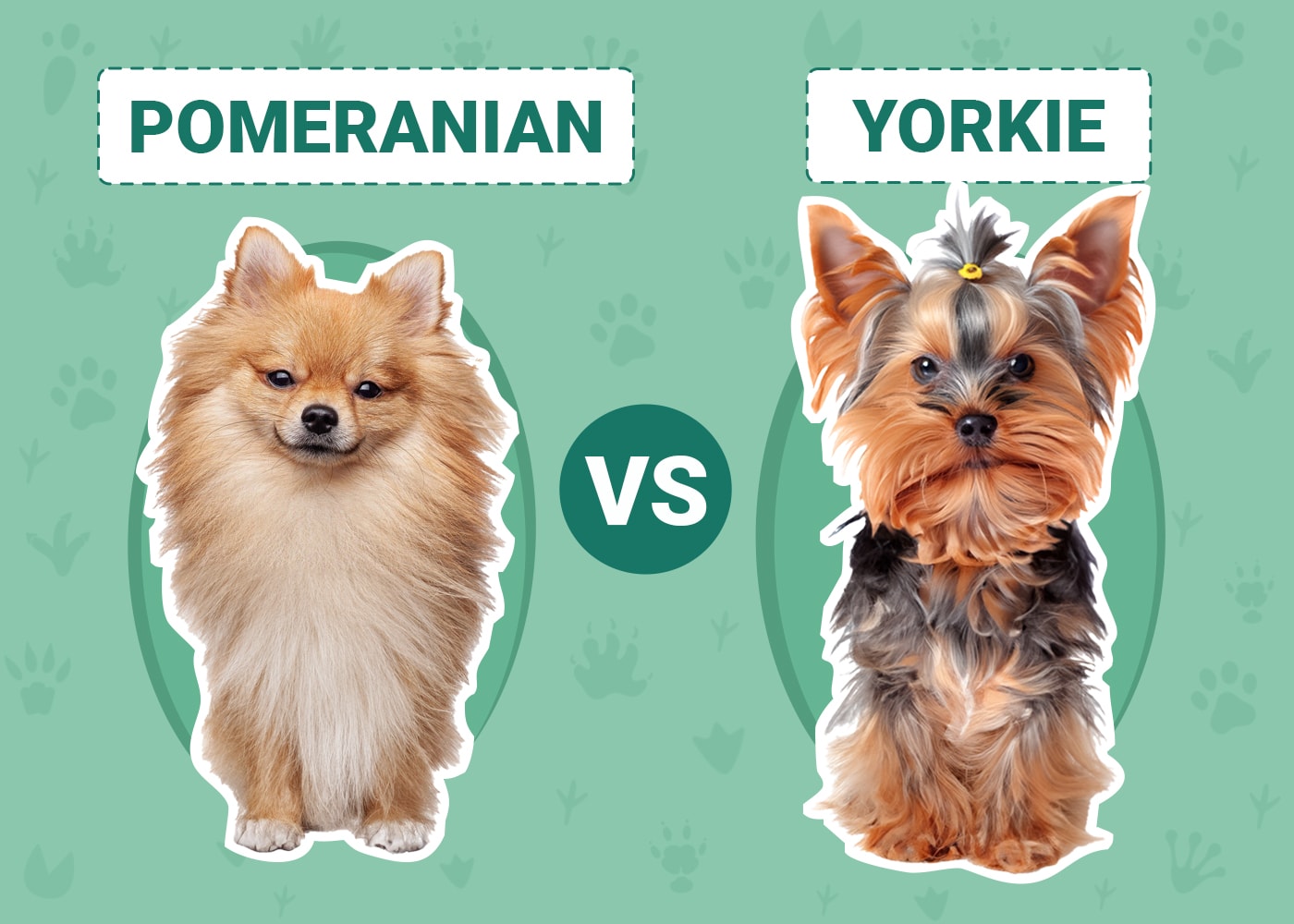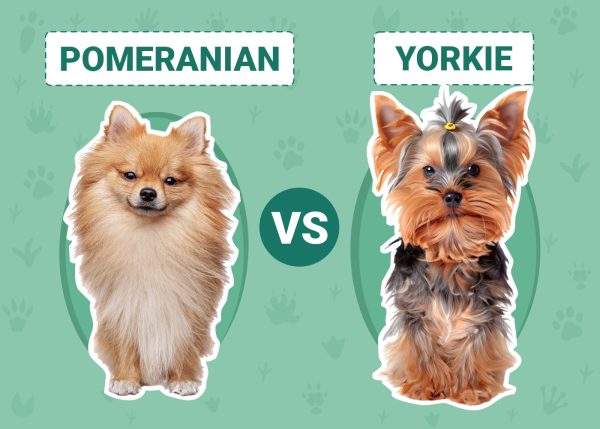Click to Skip Ahead
A spunky pint-sized pooch is an excellent addition to your household, so you could consider the Pomeranian or Yorkshire Terrier. While these breeds are similar in some ways, including personalities larger than their statures, they also feature differences.
It’s necessary to consider pup size, exercise, temperament, health, and grooming needs when comparing Pomeranian and Yorkie for a lap dog companion. Besides appearance differences, you may consider your choice depending on your experience as a dog owner and their suitability with small children.
Choosing between a Pomeranian and a Yorkie may hinge on the hypoallergenic canine if you or a family member has allergies. Continue reading for more pointers to help you find the perfect small companion dog that suits your circumstances and lifestyle perfectly.
Visual Differences
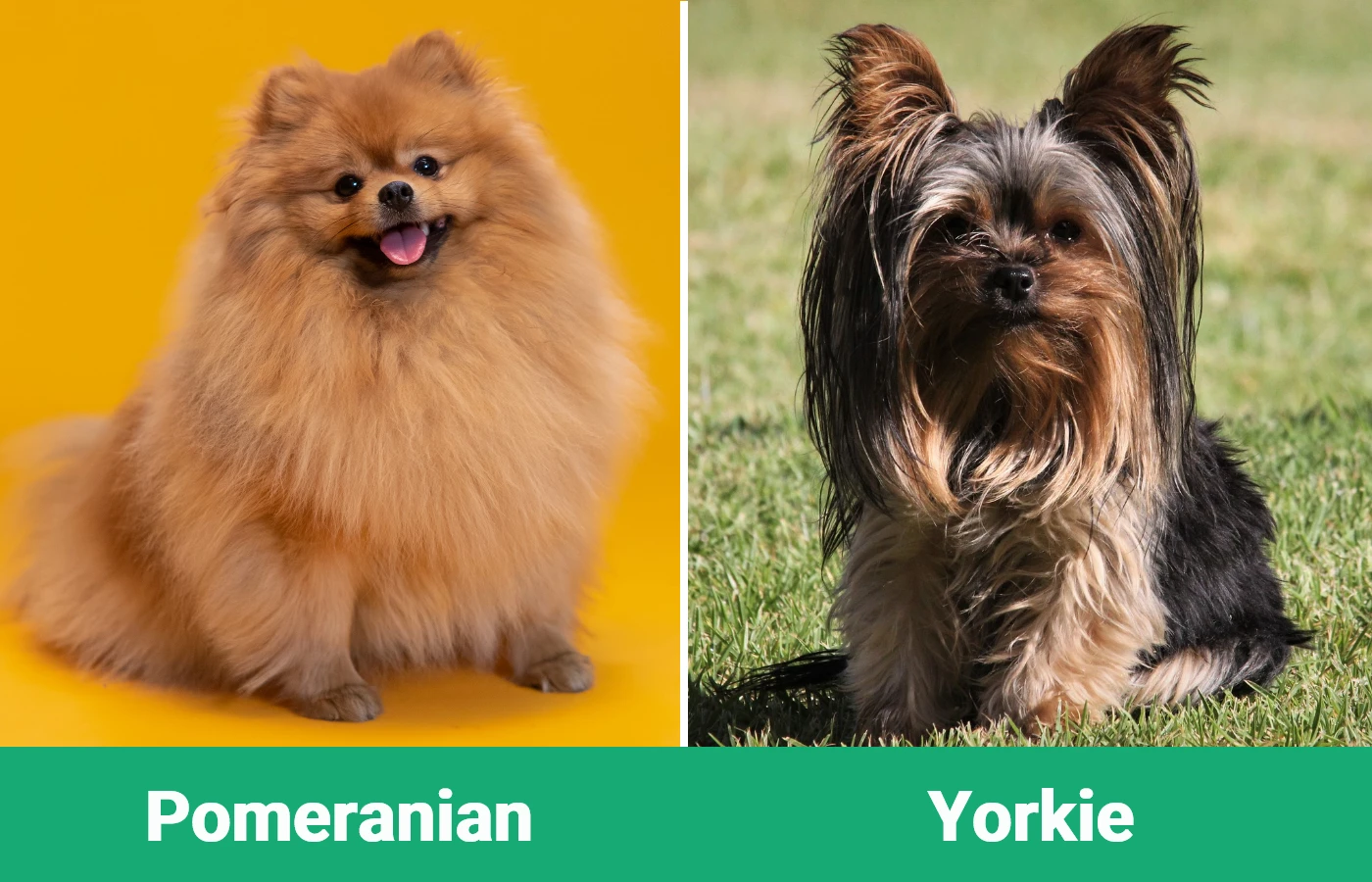
At a Glance
- Average height (adult): 7–12 inches
- Average weight (adult): 3–8 pounds
- Lifespan: 12–16 years
- Exercise: 1 to 2 hours a day
- Grooming needs: High
- Family-friendly: Yes
- Other pet-friendly: Requires adequate socialization
- Trainability: Excellent but possesses a stubborn, independent streak
- Average height (adult): 8–10 inches
- Average weight (adult): 5–7 pounds
- Lifespan: 12–15 years
- Exercise: 2+ hours a day
- Grooming needs: Moderate
- Family-friendly: Yes
- Other pet-friendly: Mostly
- Trainability: Moderately intelligent but stubborn
Pomeranian Overview
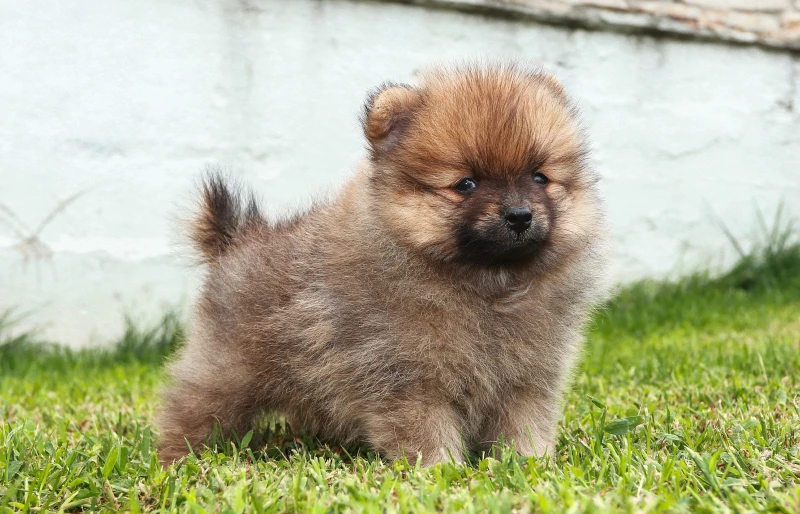
Despite their small stature, the Pomeranian was bred as a sleigh dog and has since become one of the most popular dog breeds around the world. It’s classified as a toy or lap dog, named after Pomerania, a Northeastern Germany/West Poland region where they were bred into the feisty small breed from larger cousins.
The Pomeranian or Pom is closely related to the German Spitz, American Eskimo Dog, Norwegian elkhound, and Schipperke. Famous owners of this breed include Michelangelo, Sir Isaac Newton, and famed classical music composer, Mozart, who were popularized in 1888 by Queen Victoria.
Its appearance is characterized by the thick, fluffy fur of various shades, either singularly light or dark, and it can be trimmed if you’re not keen on following a daily grooming routine.
Personality/Character
Pomeranians are self-confident, highly intelligent, loyal, and affectionate dogs that make great additions to any household. They enjoy exploring new spaces and are alert and significantly curious about their surroundings, which makes them excellent guards and watchdogs.
These dogs enjoy being the center of attention or leaders of the pack and are known for their larger-than-life personalities but aren’t overly dependent or clingy. Poms are great with children and don’t suffer from separation anxiety, but their fiery dispositions create problems around other pets when not properly socialized.
In the minds of Pomeranians, they’re larger than they are, and this trait, along with self-confidence and independence, can prove troublesome when they come across new faces or other dogs. They are highly devoted to their owners and require early socialization, which gives them a generally friendly demeanor and playfulness.
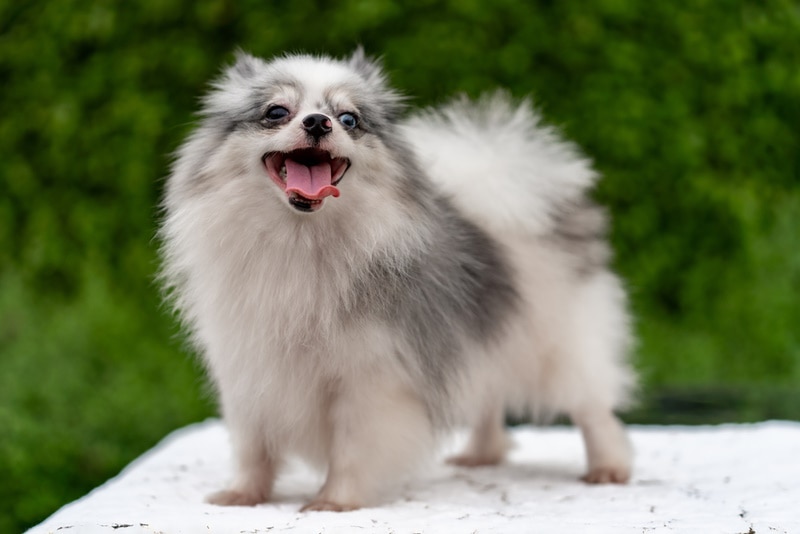
Training
Pomeranians are intelligent dogs that train easily, although their stubbornness and independence sometimes get in the way of obedience training. They learn tricks fast and pick up on commands quickly, thus are successfully trained as hearing assistance and therapy animals.
The breed has become popular with tracking circles and agility; although they aren’t overly energetic, they’ll learn with ease. They may be some work to housetrain, so they require consistency and patience, as well as a substantial amount of daily exercise to stay out of mischief and be happy and healthy.
Health & Care
There aren’t many genetic issues associated with Pomeranians to worry about. But though generally healthy, they suffer minor problems like inflamed eyes, allergies, and bouts of epilepsy, which aren’t challenging to manage or treat.
Collapsing trachea is another issue that’s common to smaller breeds, and some Pomeranians also suffer from patella luxation. The double thick coat of your Pomeranian requires regular brushing to prevent knotting and matting, while trimming is necessary for warmer climates to avoid heatstroke.
In terms of feeding, your Pomeranian needs at least ½ a cup of kibble divided into two meals depending on your dog’s size and energy level. It prefers high-quality dry food.
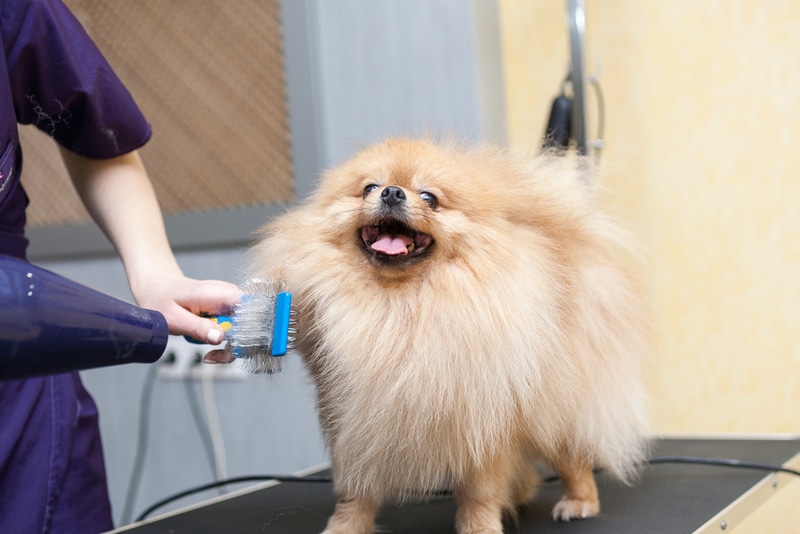
Breeding
Official breed standards for Pomeranians include a fluffy double coat recognizable in various colors but common in orange, red, and light brown. It’s a purebred dog ranked as the 23rd most popular dog in America by the AKC, which first entered them into their studbook in 1888.
Suitable For:
The Pomeranian is a favorite of small dog owners, given its minimal drooling potential. It is ideal for people with limited living space and parents with active lifestyles. It’s also suitable for the single and elderly as it adapts well to being left alone and traveling alongside its owner.
Poms love the sound of their voices and being an active ball of energy isn’t suitable for noise-restrictive households. Despite their love of romping around the house or yard, they don’t cause much damage, mainly due to their small size.
- Independent toy dog breed that rarely suffers separation anxiety
- Cheaper than a Yorkie, generally costing around $400
- Ideal companion dog for adults and seniors
- Needs daily brushing and grooming to prevent tangles and mats
- Known for excessive barking and challenges with housetraining
- Susceptible to small dog health problems like trachea collapse and seizures
- Can be nippy and not ideal for households with small children
Yorkie Overview
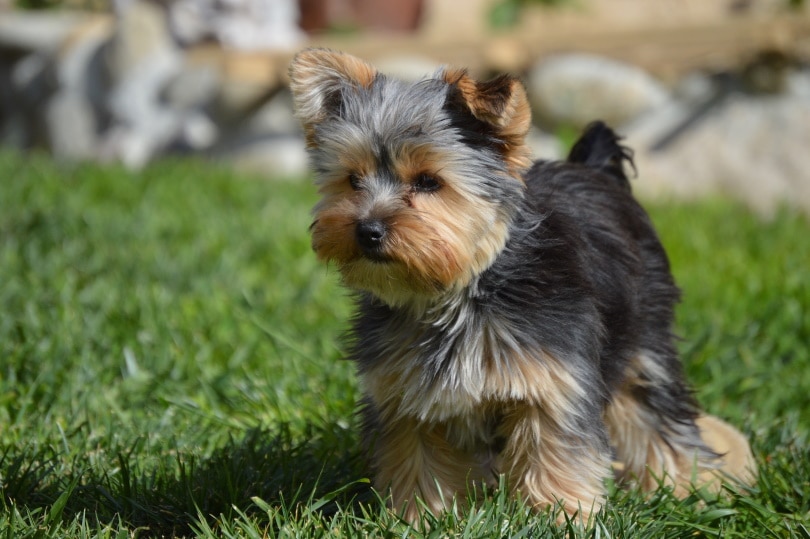
The Yorkshire Terrier, or Yorkie, was developed in the Lancashire and Yorkshire counties of England mainly for rat hunting and extermination. It is a popular canine pet for city dwellers due to its friendly temperament and small size.
Beneath the friendly demeanor, however, the Yorkie is a feisty rattler that’s ferocious and fiery but loyal and brave. The pampered pooch is recognizable by its tan coat with silky brown and smooth fur.
One of the Yorkie’s most endearing characteristics is that it is hypoallergenic, meaning it’s suitable for owners or family members with allergies.
Personality/Character
The Yorkie breed comprises adventurous small dogs that are confident and intelligent with people-loving characteristics. They tend to suffer from separation anxiety if not attended to for long periods- they are happiest when they’re close to their owners.
Yorkies are courageous and fiery, with a bigger bark than bite, which leads to challenges if not socialized early, especially with larger dogs. However, this breed loves and is gentle with kids, although its loyal streak can prove cumbersome and make it nippy when encountering touchy children.
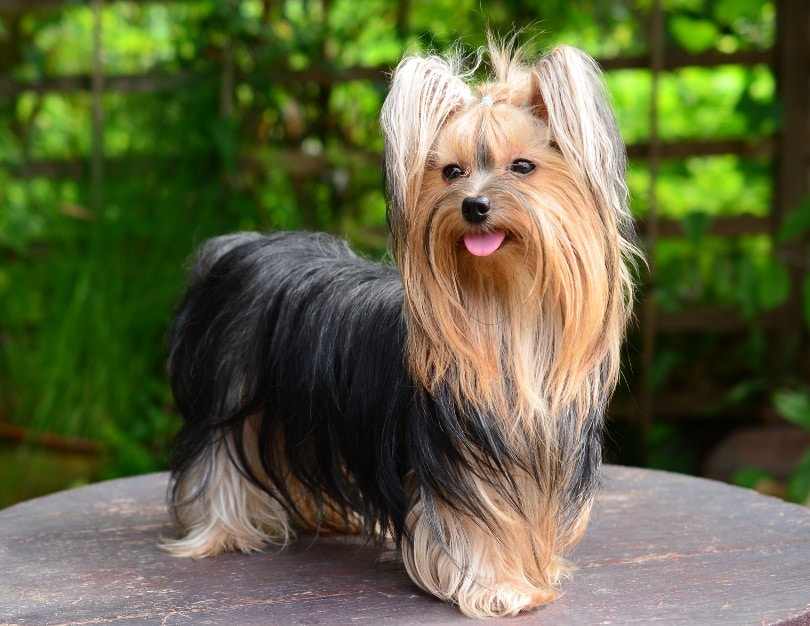
Training
The eagerness to please and intellect of Yorkies makes them generally easy to train, although house training can prove challenging. Your Yorkie will thrive off positive reinforcement and reward-based commands if you start early due to the breed’s strong-willed spirit. Early socialization is also recommended- the younger they are, the more receptive they will be toward learning.
During their first few weeks, a Yorkie pup can go to the potty every hour, and during this period, you need to take it outside more and offer loads of praise rewards. You should take your pooch to perform their delicate business 10 to 20 minutes after meals as that’s when they’re most likely to request their toilet.
Health and Care
Although they’re relatively healthy, Yorkies are susceptible to certain health issues common to small dog breeds. Along with collapsed trachea, other challenges include progressive retinal atrophy and patellar luxation.
Yorkshire terriers’ luxurious and long coats require daily brushing and grooming to prevent matting and knotting. Their long ears, which are significantly droopy, also have to be kept dry at all times to avoid getting infected, and you have to check for such signs, including redness, frequently.
Yorkies and other small dog breeds are prone to dental diseases, and you must take special care to maintain their oral hygiene. Brush your pet’s teeth several times weekly to remove any plaque and tartar buildup.
Around ½ a cup of high-quality dry kibble is sufficient for their nutritional requirements. Divide this meal into two and take care not to overfeed your pup as they’re prone to being overweight, which is one of this breed’s most common health challenges.
Towards accomplishing weight watching, the medium-energy Yorkie requires at least 30 minutes of daily exercise and mental stimulation in between with toys and yard play.
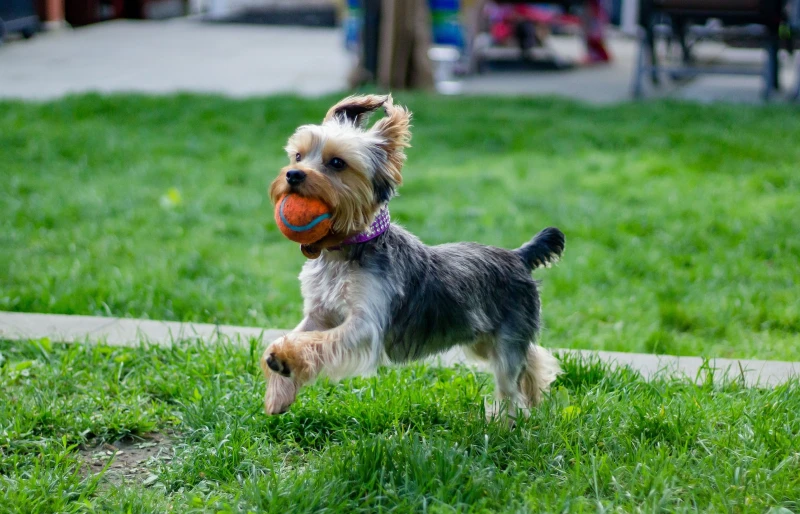
Breeding
Several breeds, some of which are extinct, were used to develop the Yorkshire terrier, and they were originally mainly owned by weavers as working-class dogs. They could fit into tiny crevices because of their small size and catch vermin such as rats, but their long silky coats were the ultimate loom products.
The English kennel club officially recognized the Yorkie breed in 1886, making them fashionable as lap dogs and subsequently leading to their size decrease.
Suitable For:
Often compared to other terrier breeds, Yorkies are the AKCs 10th most popular dog breed, and they’re great for apartment living as long as they are given sufficient exercise.
It’s an excellent dog for families, but a close eye is needed, especially around children, as they’ll occasionally nip if they aren’t properly trained and socialized.
They also make ideal pets for seniors but will tend to suffer separation anxiety if left alone for a long time.
- Loyal and friendly temperament, especially towards its owner
- Intelligent and easy to train
- Hypoallergenic breed due to minimal shedding
- Bark less compared to Pomeranians
- Require daily brushing and grooming to prevent fur tangles and mats
- Expensive to buy with prices starting at $1,000
- Doesn’t do well in families with smaller children
- Susceptible to small dog health challenges, like hypoglycemia, heat stroke, and seizures
Pomeranian vs Yorkie: Which Breed Is Right for You?
When comparing Pomeranians and Yorkies, it’s necessary to note their happy-go-lucky and friendly temperaments, which include patience with other pets. As such, these breeds are best for active pet parents with time on their hands to spend much of their day with these pups.
Despite aggressiveness not being in their nature, Poms and Yorkies do better in households where young children aren’t present. They will adapt quickly to living in small spaces such as apartments and won’t mind handling or carrying while excelling at jobs such as therapy dogs.
Both are perfect playmates and, with proper socialization, will get along with strangers and other dogs. They’re smart, perky, and alert to their surroundings, and their appearances and temperaments give them top dog status compatible with your family.
Featured Image Credit: Top – Pomeranian (ignartonosbg, Pixabay) | Bottom – Yorkie or Yorkshire Terrier (Mirko Fabian, Unsplash)

